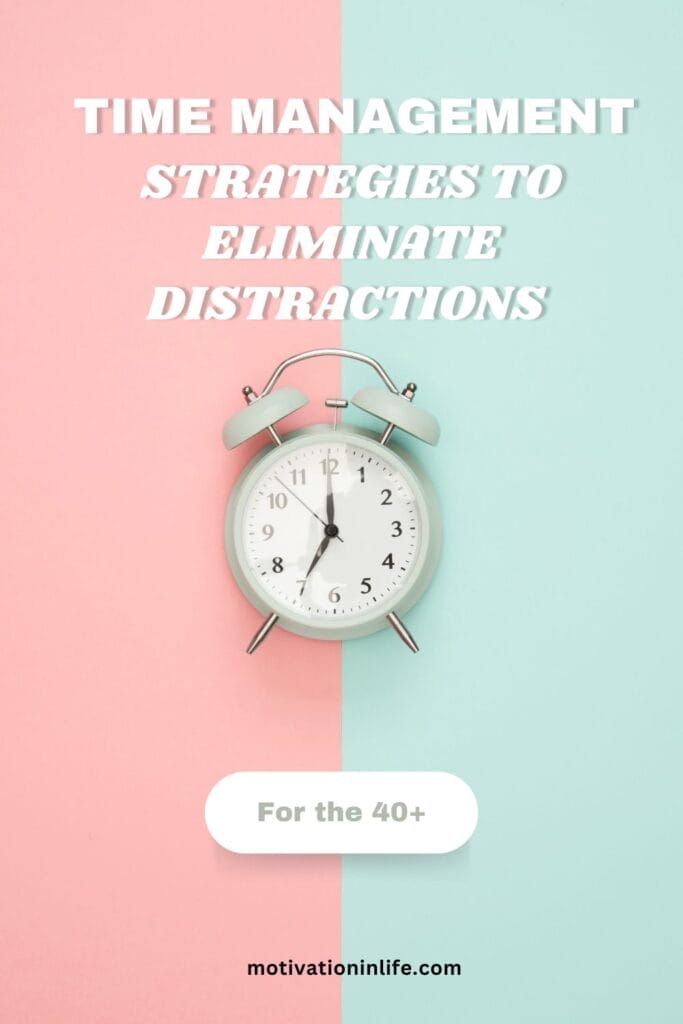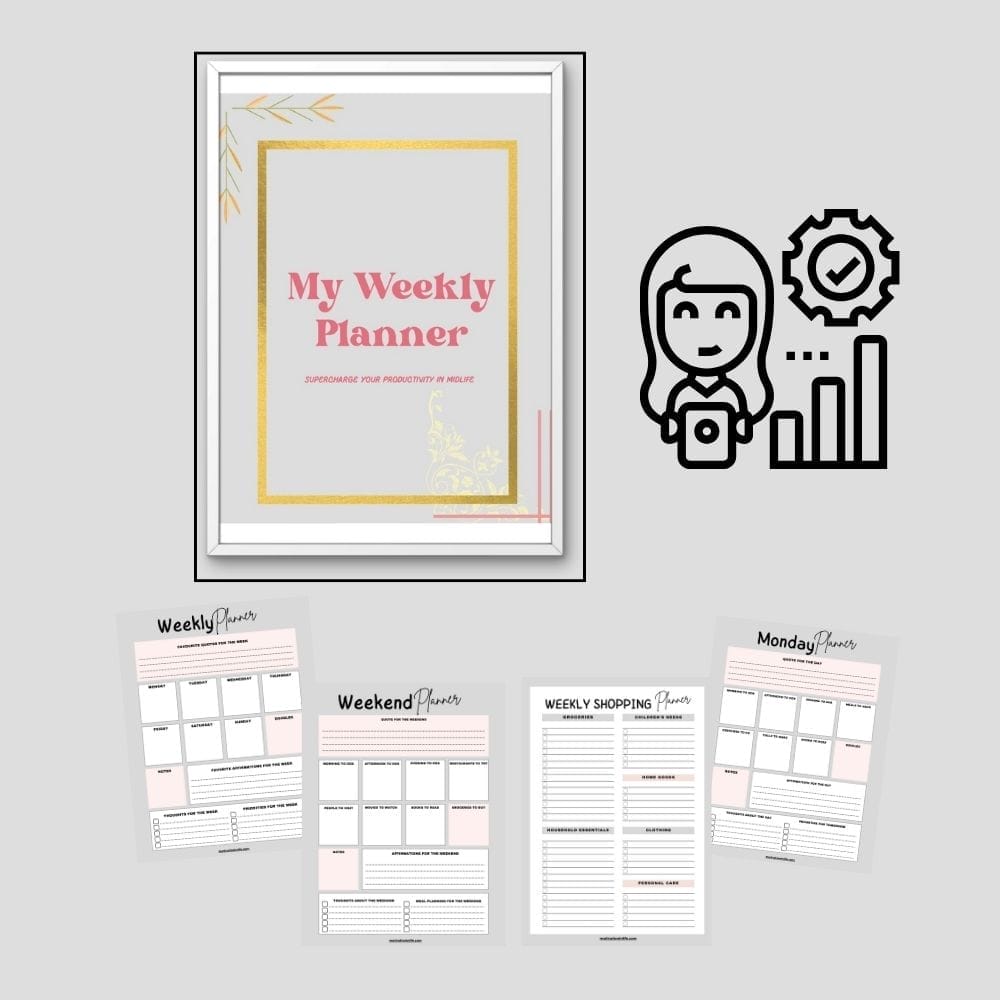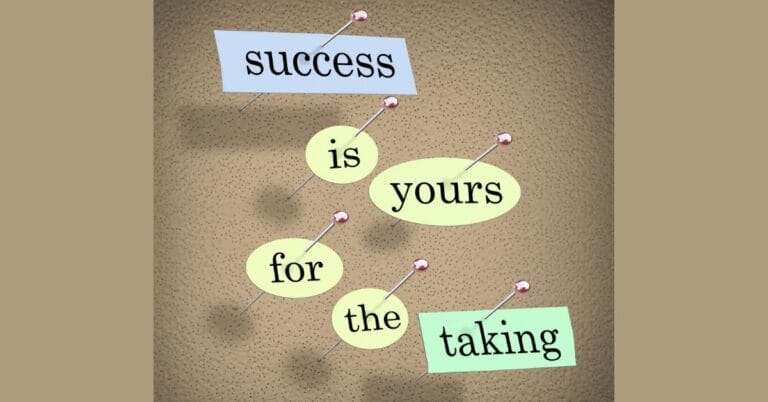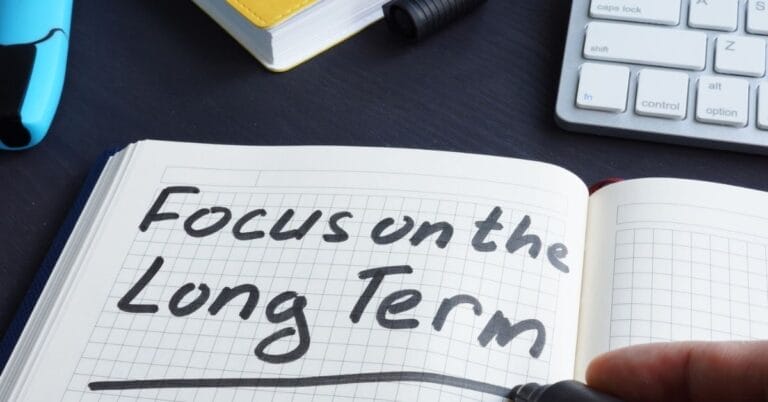Time Management Strategies: Eliminate Distractions and Make Your Downtime Productive (For The 40+)
Don’t Wait. The Time Will Never Be Just Right
Napoleon Hill
As you grow older, time becomes more precious, and how you manage it can impact everything from career productivity to personal fulfillment.
You may often feel overwhelmed by how much you need to accomplish each day, leading to constant multitasking that ultimately drains productivity.
By developing strong time management strategies and learning how to utilize downtime best, you can work more effectively and even reduce stress.
So let’s look at some practical time management strategies to help you maximize your schedule and enhance both work and personal life.
Table of Contents
AFFILIATE DISCLOSURE
This post may contain affiliate links. We may earn a small affiliate commission at no extra cost if you click on them.
motivationinlife.com is also a participant in the Amazon Services LLC Associates Program, an affiliate advertising program designed to provide a means for sites to earn advertising fees by advertising and linking to Amazon.com and Amazon.in
We may earn a small commission for our endorsement, recommendation, testimonial, and/or link to any products or services from this website.
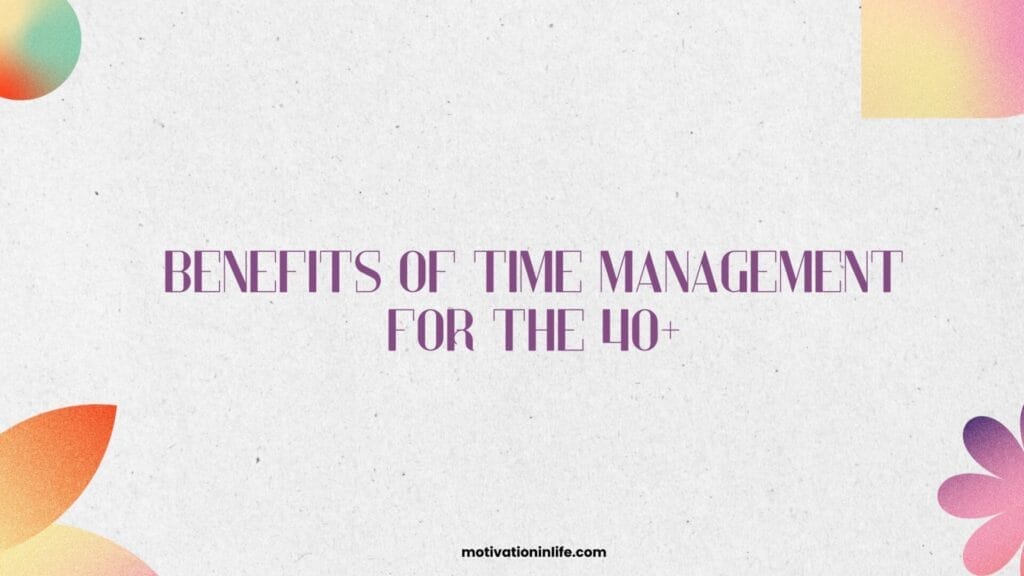
What is Time Management?
Time management is simply about planning your day in a way that makes the most of your hours.
Rather than rushing from task to task or feeling constantly busy, good time management skills help you decide what to focus on, set clear goals, and handle tasks more effectively. This way, you can accomplish more without feeling exhausted, stressed, or overwhelmed.
For people over 40, time management becomes essential to achieving a balanced life. By managing your time well, you’re able to prioritize not just your work, but also time for family, health, hobbies, and personal projects.
This approach brings a sense of fulfillment and lessens the feeling of always being “busy” without seeing meaningful results.
A great way to kick-start your time management strategy is to create an effective weekly plan. We have designed a weekly planner for you using the templates at Creative Fabrica to help you with this.
6 Benefits of Time Management for Those Over 40
There are several benefits of following a proper time management plan. Some of the benefits are:
Improved Focus and Clarity
Good time management lets you concentrate on what’s truly important, both at work and at home. As life gets busier, learning to prioritize helps reduce the mental load, allowing you to see your goals more clearly and make progress without getting sidetracked.
Are you aware of how productive you are daily? Read our blog post Answer Questions On Productivity To Manage Time Better (For The 40+) and get clarity about your productivity levels.
Lower Stress Levels
Planning tasks ahead and having a structured schedule reduces the chances of rushing through your day. This reduces stress, as you know exactly what needs to be done and can focus on each task with a clear head.
Greater Productivity and Efficiency
Effective time management leads to better productivity. With a clear plan, tasks are completed faster and with less effort, leaving you with more time to enjoy other parts of life. Small, practical changes in how you manage your time make a significant difference.
Your daily routine can make a huge difference in how productive you are. read our blog post Why Your Routine Matters For Changing Life Habits (For The 40+) to understand this aspect.
More Time for Health and Wellness
As you age, health becomes a priority. Managing your time well allows you to fit in with physical activity, prepare healthy meals, and get enough rest, helping you feel energized and stay healthier over time.
Please read our blog post 40 Quality Healthy Habits To Start Today And Reclaim Life (For The 40+) to chart out the habits that you would like to build in your midlife!!
Better Relationships
With improved time management, you’ll have more time to connect with family and friends. Social relationships contribute to happiness, and setting aside time to nurture these bonds is essential.
Clearer Path to Long-Term Goals
Whether it’s retirement plans, learning a new skill, or investing in a passion project, time management supports your progress toward long-term goals. Making time for these pursuits helps you live a more meaningful, intentional life.
Please read our blog post Simple Life Goals: How To Achieve Your Most Important Dreams (For The 40+) to decide on the lifetime goals you would want to set for yourself today!
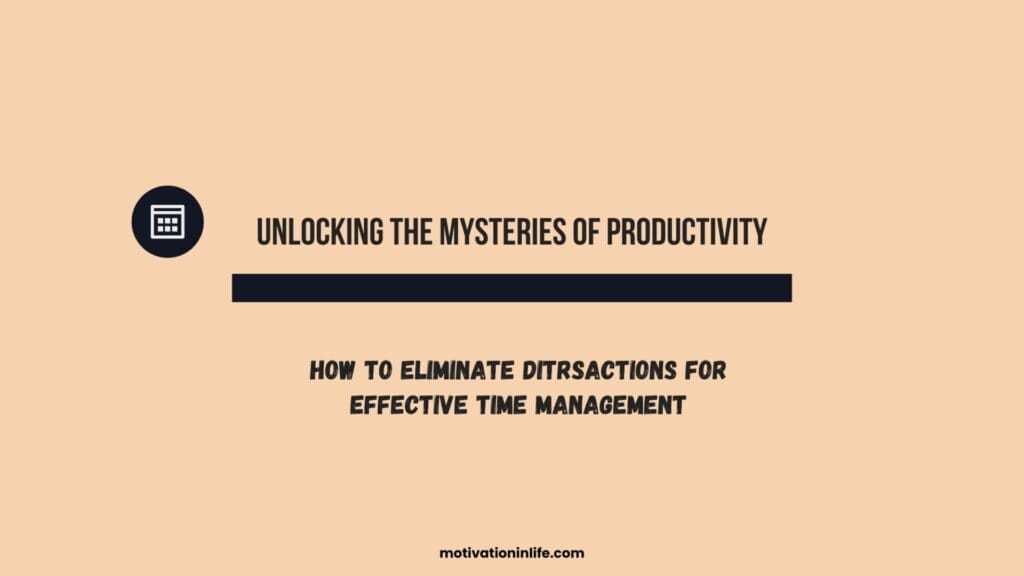
Time Management Strategies for Reducing Daily Time Wasters
Managing time isn’t just about working faster; it’s about minimizing distractions that eat up hours without adding value. Below are some practical ways to identify and manage common time-wasting habits.
Reducing these distractions is a step towards creating a day with fewer interruptions and more focus.
Bernard Clive famously said, “We don’t manage time; we manage activities within time.” This is especially true when it comes to the subtle time-wasters and delays that sneak into our day-to-day routines.
Instead of getting bogged down by tasks that feel pressing but unimportant, it’s worth focusing on ways to maximize our time effectively—even during those moments of procrastination.
By addressing common time wasters and turning idle moments into productive ones, you can clear space for what truly matters and give yourself more freedom down the line.
Let’s look at the common traps of wasted time and explore how we can turn them into useful opportunities.
Building effective time management skills starts with identifying activities that quietly sap your productivity. Reducing or eliminating these time-wasters can help create more room for the tasks and goals that matter most.
What if someone told you that you could create a second brain for yourself which will store all the information for you in one place and you will never have to hunt for any of your stuff information again?
I recently attended the second brain challenge organized by my blogger friend Lindsay Kelly and I must say I was completely blown away.
She taught me how by using Google Sheets I could literally save all the information that was scattered here and there both in my business and personal life. It has been such a time saver for me and immensely reduced my distractions.
I would highly recommend that you try out the course where Lindsay teaches you how to store all your information using Google Sheets in her building her second brain challenge course.
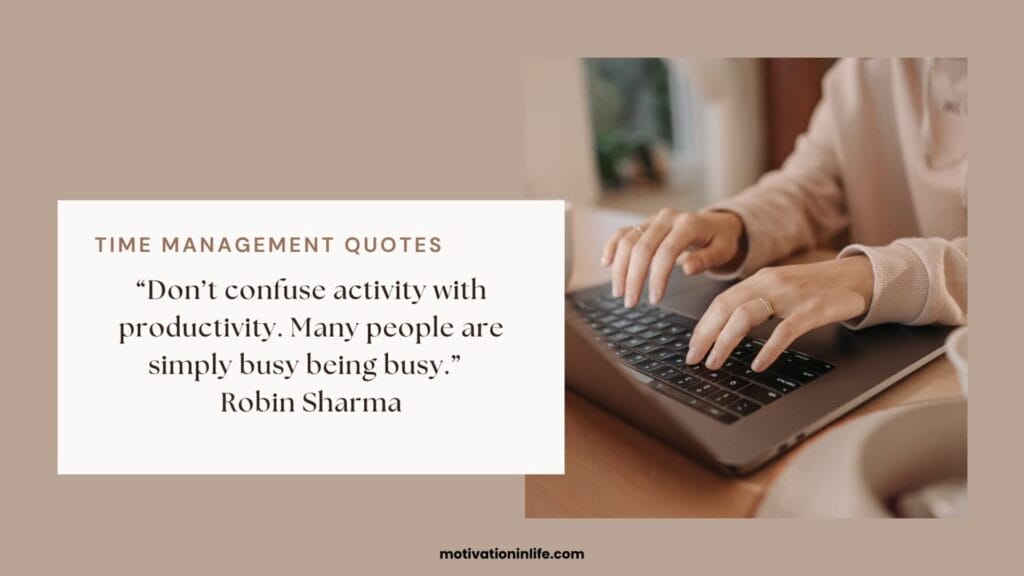
Skip The Indecision
Once you decide to complete a task, don’t second-guess yourself. Stick to your choice and get it done.
Planning and commitment are essential to master time management. If you’ve chosen to tackle a task, avoid rethinking your approach.
Constantly wondering if you should switch to another task only drains your energy and slows you down. Being decisive allows you to focus on the work at hand and complete it more quickly.
Committing to decisions in advance gives you effective time and mental space for other work.
Saying “Yes” Too Often
If you’re often asked to “help out” with small, quick tasks, it’s easy to fall into the habit of saying yes to every request.
While it’s natural to want to be helpful, saying yes too often can clutter your schedule with other people’s priorities.
Focus on your term goals first. Then, decide if you have room for extra tasks. Saying “no” politely but firmly can help prevent a backlog.
Setting boundaries is one of the most valuable time-management tips you can apply, allowing you to stay focused on your objectives.
Prioritizing Smaller, Easier Tasks
Addressing smaller tasks first may seem efficient, but it’s usually the bigger, more important work that needs your attention. One effective time management strategy is to prioritize the challenging or critical tasks first, often referred to as using the “Eisenhower Matrix.”
It is important to prioritize your tasks by importance, not ease. Getting the big, necessary tasks out of the way gives you momentum, and then the smaller items can be handled without stress.
This approach helps prevent large tasks from piling up.
Multitasking and Lack of Focus
The quality of your work often suffers when multitasking. Instead, focus on one task at a time, giving yourself brief breaks as needed.
Set aside short blocks of focused work time—around 50 minutes—with short breaks of about 5 to 10 minutes in between. This structure helps maintain focus and keeps you from drifting to other activities or checking your phone, email, or social media.
This focused approach not only conserves mental energy but also allows you to make steady progress without unnecessary interruptions.
You can use the time-blocking planner designed by the famous Carl Newport the author of Deep Work, to effectively apply the time-blocking technique to schedule your day!
Interruptions and Social Media
Between social media, email notifications, and unplanned conversations, modern-day distractions abound. Limit interruptions by setting boundaries during work hours letting others know when you’re available
This simple change can help you achieve more and reduce stress, as your mind remains on the task at hand and can make a big difference in your productivity.
Please read our blog post How To Manage Your Time For Better Balance and Productivity (For The 40+) for tips to properly utilize your time daily!
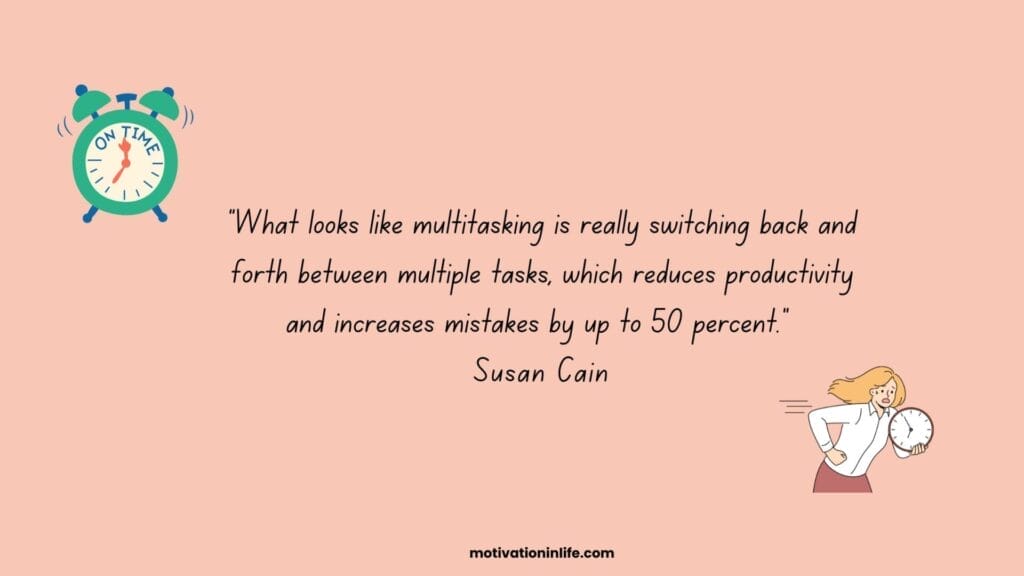
Steer Clear of Perfectionism
Finishing a task is more productive than endlessly trying to perfect it.
Quality matters, but constantly seeking perfection in every task drains time. Once you’ve reviewed a completed project or task in hand, move on to the next.
Mastering the art of “good enough” is essential for effective time management.
Frequently Changing Your Workflow
If you have a reliable way of doing something, stick with it. Constantly changing your methods or overhauling routines can create inefficiencies and slow you down.
Consistency matters when it comes to time management. Once you have a plan that works, avoid changing your approach. This stability in workflow allows you to build effective management skills and eliminates unnecessary time spent readjusting.
Avoid unnecessary changes unless you have a clear reason to make them.
Refrain From Excessive Planning
While it’s helpful to stay organized, too many lists and schedules can be overwhelming. Try creating one central to-do list that covers your priorities for the day, focusing on what’s most important.
Stick with one main list or calendar, follow it, and adjust as needed. This approach reduces confusion and keeps your attention on what truly matters.
You should be intentional about the way you spend your time, and for this, you can take the help of the intentional week success guide that has been designed by my fellow blogger E Beecroft
Constantly Checking Email
Instead of reacting to emails throughout the day, block out specific times for them. This could mean checking emails once in the morning and once in the afternoon. Handling emails in batches keeps you from being pulled away from your work every few minutes.
This focused scheduling approach minimizes disruptions, letting you manage your time without endless interruptions.
If you need help in knowing about the different ways you can block out your distractions, please read our blog post 18 Amazing Apps For Procrastination To Beat Procrastination (For The 40+), which will provide you with a list of apps that will improve your productivity.
Not Conducting a Time Audit
Without understanding how you’re spending your time, it’s easy to overlook areas for improvement.
A time audit—a simple review of where your hours are going—helps you identify routines or habits that may be draining your energy and allows you to create more effective time management strategies.
My blogging coach Sadie Smilie always talks of conducting a time audit and checking your energy levels while you perform each of your tasks.
You can check out her free blogging foundations course. Not only will you learn a new skill but you also get a time audit sheet to track time of your time for free.
Overloaded To-Do Lists
Avoid stacking too many tasks on your current to-do list. If additional tasks come up, place them in a separate list for future planning. Clearing your existing tasks first provides a sense of accomplishment and prevents overwhelm.
Developing these time management strategies helps you use each day more effectively, allowing for a balance between productivity and meaningful downtime.
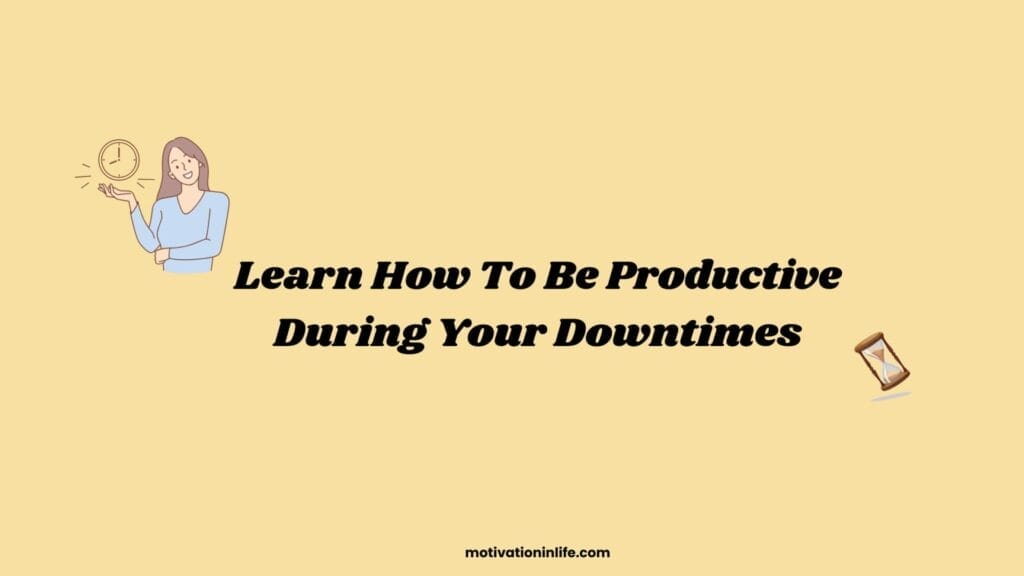
Make Downtime Productive By Making Time to Have Fun And For Yourself
Sometimes, downtime or moments of procrastination are inevitable. During these times, consider activities that can make the best use of your break.
Procrastination often gets a bad rap, but the real problem isn’t delaying work—it’s how that time is spent. Instead of scrolling through videos or social media, consider using those spare moments to accomplish small but useful tasks.
By turning idle time into productive time, you’ll be setting yourself up with a bit of extra freedom later on to focus on the task you’re putting off now.
Here are ways to stay productive, even while waiting for the motivation to return.
Declutter Your House or Office Space
If you’re not ready to dive into your main work, use the time to straighten up your surroundings. Vacuum, wash the dishes, or take out the trash.
Similarly, a clean, organized workspace can improve your focus, making it easier to return to work. Whether it’s wiping down surfaces or filing documents, tidying up provides a refreshing change of pace.
A clean space can help you feel refreshed and ready when you’re ready to tackle the bigger tasks.
Read our blog post How To Start Decluttering When Overwhelmed: A Step By Step Guide (For The 40+) to get an idea of how to go about decluttering either your house or workspace.
Address Important Emails and Calls
Use any free time to manage essential communications. Clearing your inbox or returning calls during these moments ensures that nothing important slips through the cracks.
Plan for Long-Term Goals
Downtime is ideal for organizing your calendar, setting up appointments, or planning important long-term goals.
Whether it’s scheduling a doctor’s appointment, setting up a meeting, or planning to renew your driver’s license, taking care of it now can reduce stress later. You can use it to plan and look into the bucket list of life goals you would like to accomplish in your midlife!!
These management skills help you feel in control and give you clarity about upcoming commitments.
If you are not sure about how to effectively set your goals, please read our blog post on Setting Goals Effectively: 10 Unusual Techniques To Better Your Life (For The 40 +) to plan your long-term goals with ease!!
Reconnect with Friends or Family
If family or friends have been wanting to hear from you, take a few minutes to call them. A short chat can brighten someone’s day—and yours, too.
Instead of spending downtime on social media, try calling a family member or friend. Strengthening social life connections is an excellent way to use idle time, providing a boost to both your mood and theirs which is so important as you age.
Return Missed Phone Calls
Much like emails, phone calls can pile up. If you’ve been putting off returning calls, now is the time. Handling these tasks while procrastinating on a task or during your downtime keeps you moving forward, even when avoiding other work.

Run Errands
Small tasks like picking up groceries or dropping off a package can be done during unplanned breaks. This approach keeps your schedule on track without adding to the regular workday workload.
Exercise or Stretch
Getting up and moving—even for a short walk or stretch—can be a helpful way to take a break. Physical activity recharges your mind and can prepare you to tackle tasks with a renewed sense of energy.
Please read our blog post 17 Habits To Change Your Life For Positive Attitude (For The 40 +) which will help you build habits that will keep you in good shape in your midlife!
Review Benefits and Important Documents
Take the opportunity to review any personal paperwork, like updating life insurance policies or re-evaluating retirement accounts.
These actions allow you to stay informed about important aspects of your life management and reduce the risk of missed details.
Clear Out Digital Clutter
When did you last organize your computer desktop, clean out spam emails, or clear unnecessary files? A tidy computer reduces stress and helps you stay organized, which is always worth the effort.
Use idle time to delete outdated files or organize your desktop. Digital clutter can create unnecessary stress, and clearing it out leaves your computer more organized and easier to navigate.
Take a Short Rest or Meditate
Sometimes, a quick rest or a few moments of meditation is the most productive way to recharge. Use the time to recharge with a short nap, some music, or a bit of reading.
Relaxing now allows you to return to work with renewed focus, helping you stay efficient.
Handle Bills and Financial To-Do’s
If you have bills to pay or documents to organize, this is a great use of downtime. Managing financial matters promptly can reduce stress and allow you to focus on other goals.
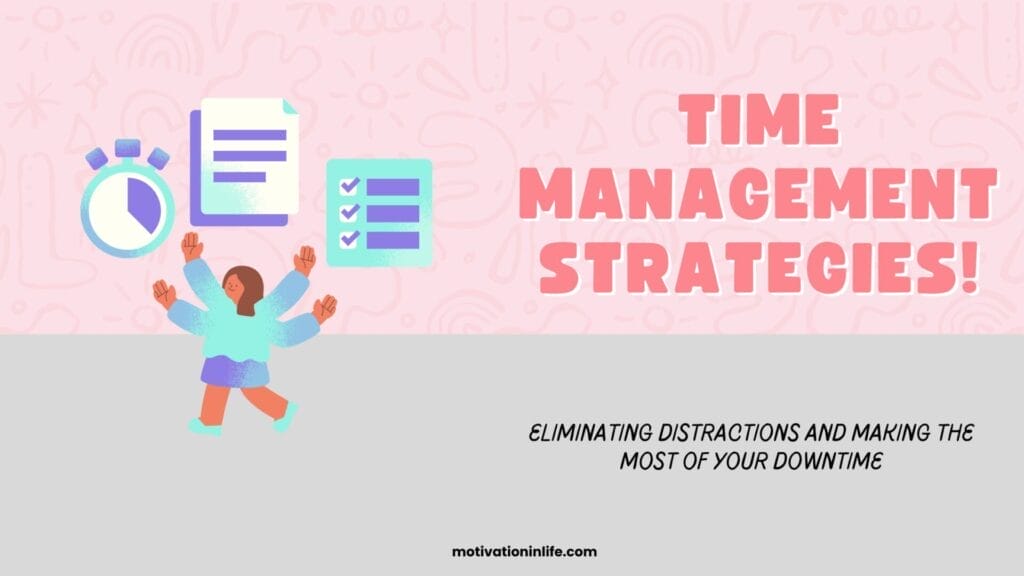
Time Management Strategies- Creating A Balanced Approach For Managing Your Time
Mastering time management requires balancing productivity with a thoughtful use of downtime. By keeping distractions in check and utilizing spare moments for helpful activities, you’ll not only get more done but also build lasting skills that bring structure to both work and life.
Refer to these time-tested time management tips whenever you feel your time management strategies have gone haywire. You will realize where you have gone wrong in your strategy.
Remember, it’s not just about the quantity of time but how effectively you use it. When you approach each day with intention, you’ll feel more in control of your time and ready to tackle each task with focus and energy.
Recommended Reads For Learning More About Time Management Strategies
- The 7 Habits of Highly Effective People by Stephen R. Covey (Amazon.com | Amazon.in)
- Getting Things Done: The Art of Stress-Free Productivity” by David Allen (Amazon.com | Amazon.in )
IF YOU ENJOYED READING THIS POST, PLEASE PIN ONE OF THESE IMAGES BELOW!
I will be grateful for your kind gesture. Thank you!
